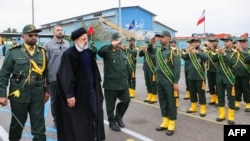The United States attributed a drone attack on a U.S. Army base in northeast Jordan that killed three U.S. troops and wounded more than 40 others to the Islamic Resistance of Iraq.
The U.S. National Security Council’s John Kirby said on February 2 that the group is an umbrella organization for Iran-backed militias, including Kataib Hezbollah.
CBS News reported on February 2 that the White House has approved a Pentagon retaliation plan that includes a series of missile strikes targeting Iranian personnel and facilities in Iraq and Syria.
President Joe Biden said Iran is responsible for the attack "in the sense that they're supplying the weapons to the people who did it."
U.S. Defense Secretary Lloyd Austin said at a February 1 press conference that “precise knowledge of what Iran knew or didn't know” about the attack is “immaterial,” since the Islamic Republic “sponsors, finances and, in some cases, provides advanced conventional weapons training to these groups."
“They are Iran’s proxies,” Austin said.
Iran denied any such links, with Amir Saeid Iravani, Iran's ambassador to the United Nations, claiming in a letter to the U.N. Security Council:
"[T]here is no group affiliated with the Islamic Republic or Iran’s Armed Forces, whether in Iraq, Syria or elsewhere, that operates directly or indirectly under the control of the Islamic Republic of Iran or acts on its behalf."
That is false.
The British defense and security think tank Royal United Services Institute estimates that there are at least 40 militia groups “closely funded and essentially operated by Iran's powerful Islamic Revolutionary Guard Corps,” CBS News reported on February 1.
Homeland Security Today, a U.S.-based publication associated with the Government Technology and Services Coalition, a nongovernmental trade group, reported in a February 1 analysis that Iran-controlled militia groups were responsible for most of the 3,000+ terror attacks that occurred between 2018 and 2023 in the Middle East and Horn of Africa regions.
The U.S. Council on Foreign Relations (CFR) reported that Iran’s Quds Force, part of the Islamic Revolutionary Guard Corps (IRGC), serves as the contact point between Tehran and its proxies, providing them with training, weaponry and funds.
Based on joint research by The Financial Times and the International Institute for Strategic Studies, the CFR mapped data on the 12 most notable Iran-backed militias active in the Middle East-Africa regions as of October 2023.
The research estimated the combined number of the 12 militias’ fighters at between 124,000 and 198,000. In nine of the 12, Iran’s control over the militias is “strong,” and in the remaining three it’s “moderate,” the CFR asserted.
Fighters from Shiite Muslim-majority countries such as Iraq and Lebanon make up most of these militias.
One of them, Hezbollah, a Lebanese political party and militia group, is notorious for its involvement in acts of terrorism.
The U.S. State Department estimated that Hezbollah receives approximately $700 million a year from Iran. Tehran has also provided around $100 million annually to Palestinian groups, including Hamas and Palestinian Islamic Jihad.
Since the early 1990s, Iran, through the IRGC, has supported and trained such violent groups as Iraq's Kataib Hezbollah, Bahrain's Saraya al Ashtar militant group and Palestinian Hamas.
Between 2012 and 2023, the Iranian regime spent more than $16 billion backing Bashar al-Assad’s regime in Syria and proxy militias in Syria, Iraq and Yemen, the Willson Center, a Washington-based think tank, reported last September, citing State Department data.






